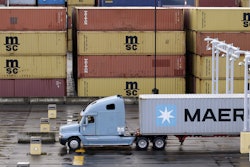London—Sept. 19, 2013—The International Transport Workers' Federation (ITF) is calling on governments and industry bodies to back a proposed amendment that would tackle the dangers posed by unweighed or misdeclared shipping containers. The amendment—to the existing Safety of Life at Sea Convention (SOLAS)—would be tabled at a meeting of the International Maritime Organization (IMO) sub-committee on dangerous goods, solid cargoes and containers beginning mid-September. The meeting would decide if the weighing of packed shipping containers would be made mandatory.
The ITF has been lobbying for nearly a decade to introduce a compulsory international system of container weighing into ports. Currently, shippers rely on self-regulation.
The ITF proposal stipulates that there should be an international law requiring the mandatory weighing of loaded containers, a process in place to address misdeclaration of container weights, and that ships’ masters should be able to refuse to load undeclared or misdeclared containers.
The ITF amendment is supported by the United States and Danish governments, as well as industry bodies, including the World Shipping Council (WSC), and the Baltic and International Maritime Council (BIMCO). The ITF is urging other country and industry representatives to demonstrate their commitment to worker and public safety standards by backing the SOLAS amendment.
Paddy Crumlin, ITF president and chair of the ITF dockers’ section, explained, “This is a key issue for transport workers worldwide. We estimate containers, which are declared as one weight, but in reality, are substantially lighter or heavier, may be in the region of 20 percent of cargo. That presents a major health and safety risk to dockers loading and unloading in ports, to seafarers onboard cargo vessels, and to drivers transporting containers on the roads.”
Crumlin continued, “But this isn’t just a worker issue. When a lorry jackknifes because it can’t handle the burden of the container, if a cargo ship splits in two because it’s been overloaded, when port equipment and infrastructure is prematurely worn down because of overweight containers, then you have a major issue for the public, for the environment and for shipping companies.”
To read more about this controversy, check out Supply & Demand Chain Executive’s cover story from the September 2013 issue here.














